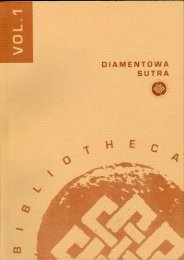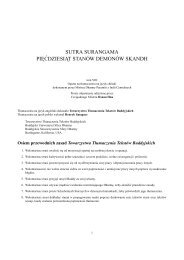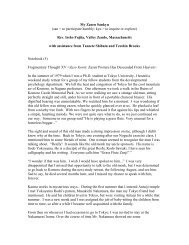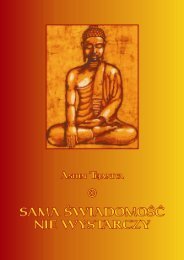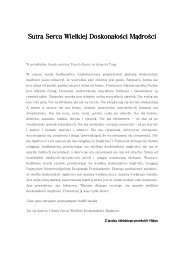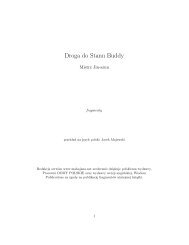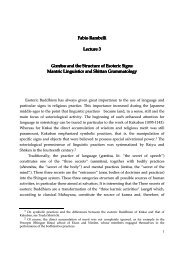Mahamudra Teaching - Dharma Media
Mahamudra Teaching - Dharma Media
Mahamudra Teaching - Dharma Media
You also want an ePaper? Increase the reach of your titles
YUMPU automatically turns print PDFs into web optimized ePapers that Google loves.
that, from this perspective, the precious human life that we have also depends on cause and effect.<br />
Since we created or accumulated great merit or good, positive causes in the past, we can call this life<br />
here and now a precious human life.<br />
Precious Human Life<br />
Even though there are so many human lives in the world, the human life, which we have, is even<br />
rarer still since it is accompanied by the eighteen favorable conditions. This type of life is very, very<br />
rare. It is not just rare to have the eighteen favorable conditions, but it is rarer still that we have come<br />
in contact with the <strong>Dharma</strong> teachings, directly or indirectly, by many forces. And then by contacting<br />
the <strong>Dharma</strong> teachings, we became interested in the <strong>Dharma</strong> teachings. They make some sense and we<br />
regard them to be something useful and feel, “I should do it.” That is so precious. We can not get this<br />
from any other source outside of us. This kind of precious human life with a genuine interest in and<br />
genuine devotion to the <strong>Dharma</strong> teachings can not be matched by even thousands of “wish-fulfilling”<br />
jewels. The wish-fulfilling jewel is so precious but the human life, which we have, nothing else can<br />
match this. So therefore we should be confident of this and possess a clear and decisive<br />
understanding of cause and effect.<br />
As for the precious human life, many of you have read books about this and about the corresponding<br />
eighteen favorable conditions. Just to refresh this, we will go through it briefly. When we talk about<br />
the eighteen favorable conditions, we are talking about both the qualities called the eight freedoms<br />
and the qualities called the ten endowments. The eight freedoms are as follows: we are free from (1)<br />
being in the hell-realms, (2) being hungry ghosts, (3) being animals, (4) being long-life gods, (5) being<br />
members of the border tribes, where teachings are unavailable, (6) a time in which no Buddha<br />
appeared, (7) wrong views, (8) an incomplete sense of body. There are so many human beings and of<br />
all those various beings, there are few that are interested in the precious <strong>Dharma</strong> teachings, and<br />
within that there are fewer that have time to practice these precious teachings. When we know the<br />
qualities of the <strong>Dharma</strong> teachings in a complete form, then we appreciate what this precious human<br />
life means. It becomes such a unique kind of technique or opportunity, which if we take advantage<br />
of, there is the distinct possibility to become free from all the delusions. This is something that no<br />
other life form can do. We are so fortunate to have such an opportunity to attain the complete<br />
Enlightenment State. That is what is called the precious human life.<br />
In considering the ten endowments, there are five which we should have within us and five which<br />
we should have from outside. The five within us include (1) to be a human being, (2) the place where<br />
we are a human being is a place which has <strong>Dharma</strong> teachings to practice, (3) we have the complete<br />
sense organs, (4) we have devotion to the Buddha, <strong>Dharma</strong>, Sangha, and (5) we have not committed<br />
any of the five heinous karma. So these are the five endowments which we should have within us.<br />
And then there are the five endowments which we should have from outside. The five conditions or<br />
endowments include (1) the Buddha must have appeared in such time in which we are, (2) Buddha<br />
must have taught the <strong>Dharma</strong> teachings, (3) the <strong>Dharma</strong> which the Buddha taught has continued,<br />
that continuity of the lineage is there, (4) there should be followers of the <strong>Dharma</strong> teachings, the<br />
Sangha members, who we can take as examples of how to study, practice, follow, in the teachings,<br />
and (5) there should be kind supporters to our <strong>Dharma</strong> practices or otherwise that we have the<br />
condition to study and practice the <strong>Dharma</strong> teachings. So these five are called the endowments,<br />
which we receive from the outside.



![Shushogi, Dogen Zenji [PDF] - Mahajana.net](https://img.yumpu.com/50921105/1/190x219/shushogi-dogen-zenji-pdf-mahajananet.jpg?quality=85)

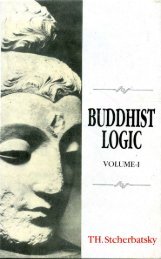
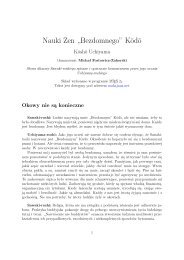
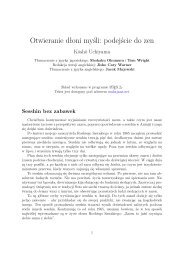
![wywiadu z Murakami Kosho Roshim [PDF] - Buddyzm w Polsce i na ...](https://img.yumpu.com/45809746/1/184x260/wywiadu-z-murakami-kosho-roshim-pdf-buddyzm-w-polsce-i-na-.jpg?quality=85)
